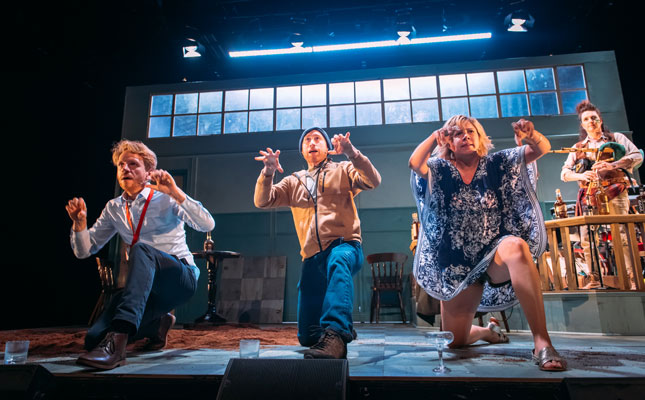“I’m calibrating my Scottishness,” says Brian Ferguson, idly shuffling around in the soil at his feet at the opening of this play. Anything That Gives Off Light is full of calibration and re-calibration, not just of national identity, but also the audience’s perception of what is going on. This National Theatre of Scotland co-production with Brooklyn-based the TEAM for Edinburgh International Festival raises some very interesting and non-obvious points about Scotland and its relation with the diaspora, but does so in a manner that sits awkwardly between straight-up road movie and allegorical semi-fantasy.
The cast of three – Scots Brian Ferguson (Brian) and Sandy Grierson (Iain), and American Jessica Almasy (Red) – devised the piece with director Rachel Chavkin and associate director Davey Anderson. It’s set in what looks like a run-down social club, where Iain and Brian encounter Red, a woman from the Appalachians who is just back from celebrating her second honeymoon, alone, in Jamaica. Brian, who has joined the modern Scottish diaspora in London, is back after eight years with his gran’s ashes. Old friend Iain suggests they take a trip to Gran’s old caravan to scatter them.
That makes it sound straightforward. It’s not. There’s already been an opening scene, shorn of obvious markers of time and location, where the three have bantered about Scottishness, and the bar-room meeting is virtually the last time until the final moments where we can be fully sure where we are.
In between times, the characters dip out of the road trip to introduce each other to the peculiarities of their cultural background. The Scots boys introduce Red to Bonnie Prince Charlie, Culloden and the Clearances, turning Red into a crofter and taking the roles of the laird and the factor themselves to show her how devastating those episodes of history were. In turn, Red introduces the Scots to the Appalachians, the land grab made by the original Scots settlers, and the modern land grab whereby big corporations plundered the mountains for their natural resources. Real and unreal is blurred, and no heed is paid to boundaries of time and space. What appears to be play-acting at the side of the road during a break in the trip becomes a scene physically located in Red’s hometown as persistent mining wreaks environmental catastrophe.
This blurring does allow stories to flow into each other, making interesting comparisons apparent. Thus the heartlessness of the Clearances seem replicated by corporate exploitation of the Appalachians. Stories of Brian’s gran protesting during the Poll Tax riots seem mirrored by the defiant old crofter played by Red. Brian’s flight to London repeats Scots settlers’ flight to America centuries earlier. But the constant shape-shifting is problematic in other ways. It feels like the piece has given up trying to separate its different elements and left meaning and interpretation in a soupy mess for the audience to pick through.
It doesn’t help that the social club style set rarely fits what is going on. It’s not clear why it’s been used, except perhaps because the obligatory NTS nod to gig theatre is present and correct, with a band of three, including Honeyblood‘s Cat Myers on drums delivering tunes from a wee stage in the corner. This acts as a useful cover for scene changes, but otherwise adds little, except where it illustrates how Scottish folk and Appalachian folk operate on the same continuum.
And yet, the play introduces such interesting topics. Iain was a Yes voter but a Brexit abstainer; Brian a remainer but couldn’t vote in the Indy referendum; both feel validated; both resent the other. Such are the complex ways that political divisions cut right now. The relationship between Scotland and its diaspora is well worth picking apart too. But all too easily, the usual play-to-the-crowd self-pitying tropes are aired about Scotland being a place that steals defeat from the jaws of victory, conveniently ignoring the fact that right now almost the exact opposite seems true. Post-Brexit, post-World Cup, it’s England that feels shame and failure; Scotland feels like a place about to seize the future, unless you’re the kind of pessimist who thinks that Scotland will mess things up again, and presumably the NTS is not in the business of generating negativity about Scotland’s future.
Anything That Gives Off Light begins to explore fascinating parts of history, and ends with a decent summation of what Scottishness is in the 21st century. Ferguson and Grierson also give powerful performances. But frustratingly, the manner of its creation has led to something muddled and unsatisfying.
